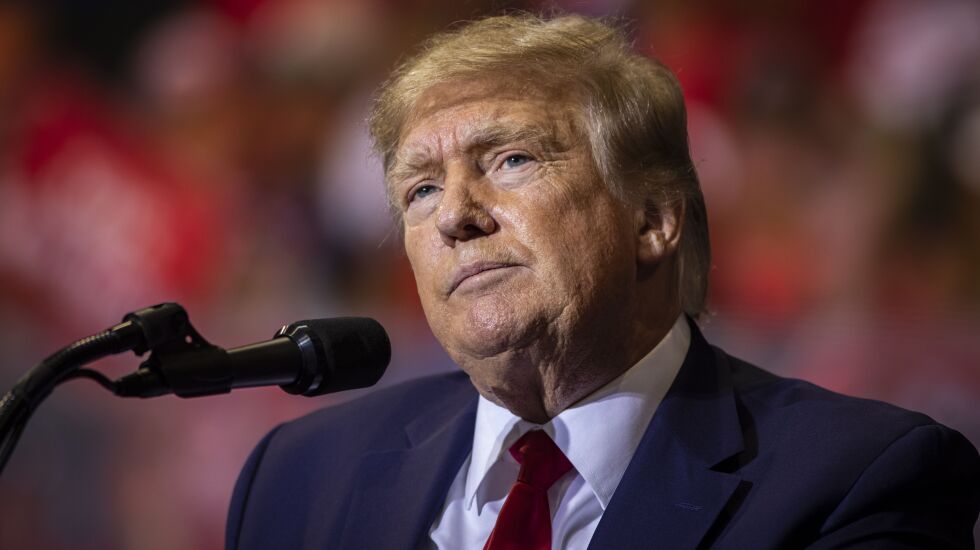
Watergate, whose 50th anniversary is upon us, is remembered for the question: “What did the president know and when did he know it?” But in our age of post-truth politics, the question loses its punch.
The Jan. 6 committee devoted the second of its public hearings to demonstrating beyond doubt that Donald Trump knew he had lost the 2020 election. The unstated assumption here is that Trump did not sincerely believe the election was stolen. He was told over and over again that it wasn’t and yet persisted in propagating a dangerous lie to the world. And therefore, he is responsible.
With all due respect to the committee (and I wish them resounding success), that’s the wrong way to look at it. In the first place, the tangle of loose wires, celebrity gossip, Putin-worship, grade school taunts and world-class vapidity that forms Trump’s mind is impossible to penetrate. We are, to our sorrow, quite familiar with his indifference to truth.
When it comes to a person who has lied about American Muslims celebrating the fall of the Twin Towers, told the country that COVID-19 was like the common cold and was “disappearing,” lied about why he fired James Comey, and lied even about the paths of hurricanes, we are dealing with someone whose lies are part of his psychology. Everyone knows this.
Consider just one contrast from the Watergate era. Part of why the tapes were Richard Nixon’s undoing is that they proved that Nixon had lied to his friends and allies as well as to his enemies. The same cannot be said in Trump’s case, because absolutely everyone in his circle and everyone in the Republican Party who made their peace with him as leader had been lied to repeatedly.
Trump had so warped the people around him that there was no expectation of honesty or integrity. What is sincerity in the mind of a man who lies with every exhale? Asking whether Trump knew the election was free and fair is like asking whether a komodo dragon prefers smooth jazz or hip hop. It’s a category error.
This emphatically does not let Trump off the hook for his lies. On the contrary. Think of tort law. If you are the owner of a dye factory and an employee sues when he’s blinded by a malfunctioning machine, you can’t escape responsibility by saying that you didn’t know the machinery was faulty. If the negligence is bad enough, it can be criminal.
Criminal negligence is a decent shorthand for the indifference to truth and/or eager embrace of lies that has come to characterize our historical moment. Are the people who get all of their news from Fox or The Federalist responsible for what they believe? They are. Every person in a democratic republic has a duty to ascertain the truth as best they can, and that means questioning the pap that they are fed nightly. It means letting the light of skepticism peek under the blanket of certainty every now and then. A Fox viewer is lied to, yes, but he or she can ask: “Why did Tucker Carlson do an entire show, on the first night of televised hearings, without commercial interruptions? What was he afraid viewers would learn if they switched channels even for a minute?”
Yes, viewers are lied to, and the liars deserve particular opprobrium, but at some point, citizens have to use the sense God gave them. If the Dominion voting machines were rigged, why did Republican House and Senate candidates do so much better than Trump? If there was a vast conspiracy to flip votes from Trump to Joe Biden, why did Trump perform better with Hispanics in 2020 than he had in 2016? If the problem was the “rigged” voting machines, why did two hand recounts in Georgia show no discrepancies?
If the riot at the Capitol was the work of antifa and the deep state, why was Ashli Babbit a martyr? For that matter, if it was antifa, why were Republican members asking Trump for pardons in the final days of his presidency? Alternatively, if it was a “normal tourist visit,” why blame it on antifa?
Finally, why would people like Brad Raffensperger, Chris Krebs, Bill Barr, Brian Kemp, Doug Ducey and Liz Cheney, who had nothing to gain and a great deal to lose by telling the truth, be doing what they are doing? If any discordant reality can be dismissed with “explanations” like “RINO” or “woke,” we have left the realm of reality altogether.
So, yes, Trump is responsible for his lies, however fervently he may tell himself and others that he believes in them, because what he believes is irrelevant. His mind is a black hole of truth. It’s not what he knows, but what he has a responsibility to know. The same goes for all of us.
Mona Charen is policy editor of The Bulwark and host of the “Beg to Differ” podcast.
Want to write a letter in response to this column? See our guidelines for submitting letters to the editor and op-eds.”







